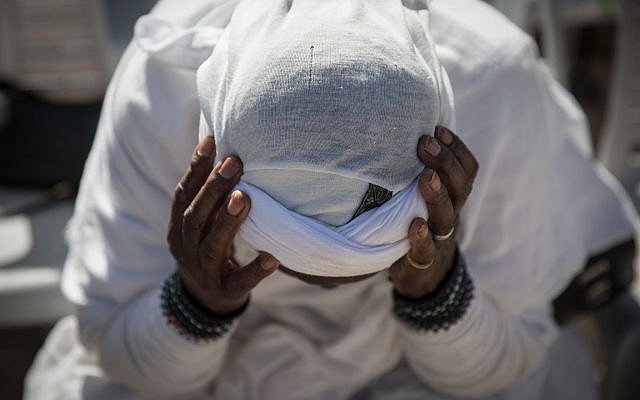Israelis who emigrated from Ethiopia and the FSU are several times more likely to take their own lives, and those tasked with helping them say a lot more needs to be done

Nearly two years after a Health Ministry report concluded that one-third of suicides in Israel are immigrants, officials and activists say the state has yet to allocate appropriate resources to handle the issue.
“No one wants to deal with it, no one wants to talk about it,” said Shoshi Eizenberg Hertz, director of the Suicide Prevention Unit at the Health Ministry. The unit, established in 2014 to coordinate the implementation of a national program to prevent suicide, retains four employees and a meager budget that shrinks from year to year.
“We’re in a war for survival,” she said.
According to the Health Ministry, in 2015, 31 percent of adult suicides among Jews and other non-Muslims in Israel were classified as new immigrants, a group that makes up only 20% of that population. Twenty-one percent of suicides were immigrants from the former Soviet Union, six percent were Ethiopian immigrants, and three percent were immigrants from various other countries.
Immigrants from the Soviet Union are defined as those who have immigrated since 1990, while immigrants from Ethiopia are defined as those who have immigrated since 1980. Between the years 2013-2015, the Health Ministry found that Ethiopian immigrants were four times as likely to take their own lives as non-immigrant Jewish Israelis, while immigrants from the former Soviet Union were nearly twice as likely to do so. Newer statistics will be available around September 2018, the Health Ministry said.
Despite the lack of resources, Hertz said she is determined to continue building safety nets for immigrant communities. She focuses on the Ethiopian community, where she searches for “natural leaders” who can, on a volunteer basis, identify and provide support to at-risk members of their communities. She said she hopes to have a network of such people in place within a year.
In addition, she mentioned the play She’eriot, which deals with an Ethiopian man who commits suicide and is being performed throughout Ethiopian communities. Hertz said she hoped the play, and the discussion that follows, will raise awareness of mental health problems and help community leaders identify members in need of aid.
LiAmi Lawrence, co-founder and CEO of KeepOlim, a non-profit dedicated to new immigrants, said his organization is working on a low-cost mental health program for new immigrants from all countries, part of which is set to be launched in two months.
The program will consist of eight-week-long group therapy sessions led by qualified counselors, a support hotline, and subsidized mental health counseling, all in the native language of the immigrant. All of the therapists working with him are immigrants themselves; “Olim,” he said, “empowering olim.”
Lawrence said the high suicide rates can be attributed to immigrants’ vulnerability: They don’t have anyone to turn to, or anyone to fight for them. “All the aliyah agencies – they drop you off like a hot potato,” he claimed.
The main challenge, according to Hertz, is to gain an understanding of immigrant communities and the changes they endure when they arrive in Israel. Suicide, she said, is not prevalent in Ethiopia, and only permeated the community when they arrived in Israel. Understanding the reason behind this shift is crucial to fixing the problem.
When it comes to other immigrant populations, her unit, due to its lack of resources, has been unable to build the necessary foundation, Hertz said. “We still need to delve more deeply into the Russian community,” she noted, while conceding that French immigrants also suffer from a high prevalence of mental health difficulties.
“It is known that immigrants are an at-risk group when it comes to suicidal behavior,” said Dr. Shiri Daniels, national professional director of Eran, a mental health crisis hotline that receives support from the Health Ministry. The hotline received 10,718 calls from immigrants in 2017, said Daniels, who admitted the need to train dozens more volunteers who speak Russian and other languages. She noted that Eran was in talks with various bodies to recruit more volunteers.
The Jewish Agency, which facilities immigration to the country and provides various services to immigrants, does not provide any independent mental health aid. In a statement to The Times of Israel, a spokesman said, “The Ministry of Immigrant Absorption is the government body responsible for ensuring that new immigrants have access to the government services they require, including in the area of mental health.”
The ministry, however, provides little independent aid to immigrants in the field of mental health. It lists its involvement in the Suicide Prevention Unit and in the National Program for Suicide Prevention (both of which are run by the Health Ministry). In addition, it promoted the integration of several Amharic-speaking social workers in the Health Ministry’s mental health system.
The ministry also began a program to train employees to be in direct contact with immigrants, and has launched “programs to raise awareness” of mental health in immigrant communities. Asked for specifics of its activity concerning mental health, the ministry pointed out the play She’eriot, as well as two research papers completed in 2009.
Yet two years after the dire suicide statistics were reported, budget shortages and lack of manpower across the organizations are preventing immigrants from receiving the mental health aid they desperately need.
“I don’t sleep at night,” Hertz said. “People are dying.”
As reported by The Times of Israel
